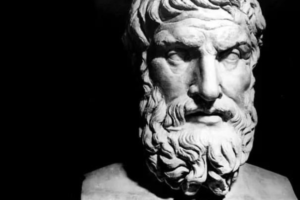The Greek Stoic Posidonius was active in the first century BC. He is known as one of the most important and prolific thinkers of his day, and the growth of Stoicism as a philosophy was greatly influenced by his teachings. This article will provide a brief account of the life and legacy of Posidonius. He is not a well known as Late Stoc Period philosophers like Epictetus, Seneca, and Marcus Aurelius, his legacy on the
Early Life and Education
In 135 BC, Posidonius was born in Syria. Having been raised in a rich family, Posidonius had a solid education in Greek philosophy and literature. Panaetius, who was his teacher, was one of the Stoics he studied under. Posidonius was greatly influenced by Panaetius, and the philosophical concepts he advanced were greatly impacted by his teachings.
Thereafter, Posidonius traveled widely throughout the Mediterranean region, stopping in sites like Egypt, Cyprus, and Rhodes. He pursued studies in astronomy, mathematics, and geography and became expert in a variety of subjects. However, he took a particular interest in the study of natural occurrences, and a lot of the scientific knowledge of his day was built on the basis of his observations and investigation.
His Teachings
Posidonius was a Stoic who believed that the universe was logical and well-ordered. The Stoics held that a divine intellect oversaw the universe and that connected everything. They emphasized the value of virtues like intelligence, courage, and self-control as well as living in harmony with nature.
He held that a divine intelligence oversaw the universe. Additionally, he thought that people were capable of understanding and appreciating its harmony and order. He thought that one of the best ways to learn about the cosmos and understand its guiding principles was to investigate natural phenomena.
Posidonius had a keen interest in the study of ethics. He held that happiness and fulfillment in life came from the pursuit of virtue. Posidonius pointed at the importance of cultivating these virtues through study and practice. This was he because he believed that the Stoic virtues of wisdom, courage, self-control, and justice were necessary for a good existence.
Influence
Posidonius had interests outside of philosophy, such as in the study of literature and history. He wrote heavily on these topics. His writings provide fascinating insights into the intellectual and cultural life of his time.
Posidonius played a pivotal role in the growth of stoicism. The philosophers who followed him were profoundly influenced by his beliefs. Several later thinkers were affected by his emphasis on the study of natural events and the pursuit of virtue. Posidonius’ writings were extensively read and admired long after his passing.
Posidonius had a significant role in his era’s intellectual and cultural life as well. He was a renowned academic and educator, and his writings had an impact across a wide range of industries. Respected by many for his wisdom and insight, as well as for his wit and oratory skills.
After Posidonius’ passing, his influence was still felt. In the ancient world, his writings were well-read and esteemed, and for centuries after his death, philosophers and academics continued to be influenced by his ideas. His emphasis on the investigation of natural phenomena and the pursuit of virtue are still significant issues in contemporary science and philosophy, and his writings continue to constitute a significant part of the philosophical and cultural heritage of the ancient world.
Conclusion
Posidonius was a key member of the Stoic school and his theories had a big influence on how the philosophy of Stoicism evolved. His writings were widely read and admired in the ancient world because of his focus on the study of natural events and the pursuit of virtue. Lastly, long after Posidonius passed away, his influence could still be felt, and his concepts are still vital to contemporary science and philosophy.









Most Commented Posts